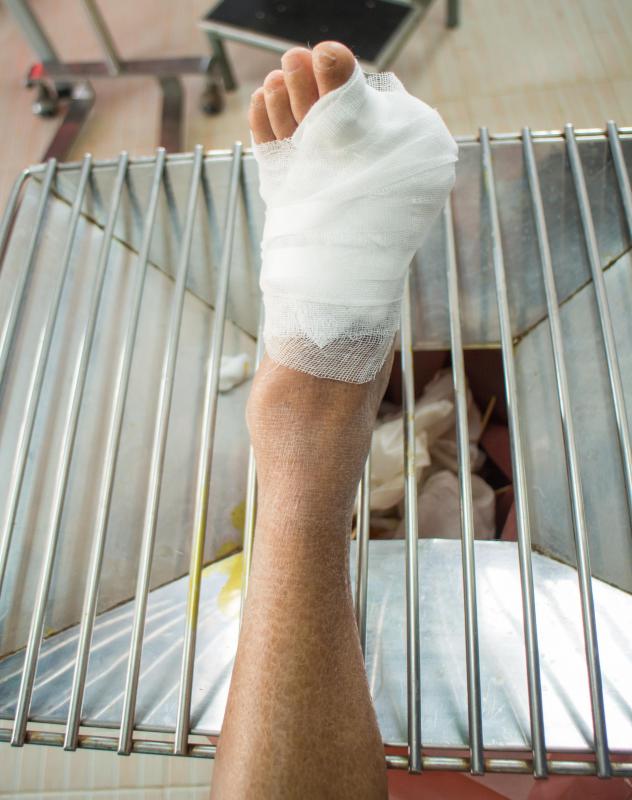At TheHealthBoard, we're committed to delivering accurate, trustworthy information. Our expert-authored content is rigorously fact-checked and sourced from credible authorities. Discover how we uphold the highest standards in providing you with reliable knowledge.
How do I Care for a Diabetic Foot Wound?
To treat a wound properly on a diabetic's foot, any bleeding should be first be stopped. If it doesn't, the person should be taken to an emergency room for medical help. The wound should be cleaned with a disinfectant made for wounds before a clean bandage is placed on top. The bandage should be changed regularly with the wound looked at daily to make sure it's healing. If the diabetic foot wound gets worse in any way, immediate medical help should be sought.
A diabetic foot wound should never be ignored. Even something that seems minor can cause a serious infection since a diabetic may not feel anything wrong due to numbness caused by neuropathy. Diabetic neuropathy is nerve damage that may affect the feet or hands as well as other body parts. Other than numbness, signs of neuropathy include a "pins and needles" feeling; this sensation may block out any pain that may otherwise warn of a serious infection. If a diabetic foot would isn't treated, it could even lead to eventual amputation if the sore becomes infected enough.

An excellent way to prevent a diabetic foot wound care is to check the feet every day out of habit and avoiding being barefoot except in bed or when relaxing at home. Even for walking indoors from room to room in the home, slippers should be worn as even tiny particles can press into the bottom of the feet and eventually lead to irritation or infection. Whereas most people would likely feel the irritation of even small particles pressed in the foot right away, someone with diabetic neuropathy may not.

Diabetics with neuropathy should be sure to have someone else trim their toenails. A main cause of diabetic foot wounds is diabetics trying to cut their own toenails; when the feet feel numb, it's easy to clip the skin next to nails rather than a toenail itself. A seemingly minor problem can turn into a major infection unless the bleeding is stopped and the wound is cared for by keeping it clean. If the diabetic can't stop the wound from bleeding or it gets worse, he or she shouldn't hesitate in getting medical help.

To help prevent a diabetic foot would from occurring, socks and comfortable footwear should be worn. Proper fit in shoes is important. If the feet move around too much in the shoes, it can cause blisters that in turn could open and cause a diabetic foot wound. Blisters or sores on the feet caused by ill-fitting shoes should be cleansed with wound disinfectant and covered with a padded bandage. Foam or gel insoles placed inside footwear may help the shoes fit better and cause less damage to diabetic feet.
AS FEATURED ON:
AS FEATURED ON:















Discussion Comments
@Grivusangel: I believe it. My former pastor was diabetic and didn't take care of himself. He stepped on something in the house and the resulting wound got really bad. He ended up losing the big toe on his foot. His doctor said his circulation just wasn't good enough for the wound to heal.
Sounds like your mom did the right thing in checking your dad's feet every day. That sounds like something every diabetic should do -- not like it's that difficult.
Prevention is *always* the best method. My dad was diabetic and was a teacher. He didn't think about it, but I would check his shoes on a regular basis, and it was amazing what I'd find on the soles: thumbtacks, staples... you name it. Occasionally, a staple or tack would get into the side of the shoe and would rub against his foot, so checking his shoes was always a regular thing.
My mom looked at his feet every night before he went to bed and put lotion on them, then he put his socks on. This helped keep the skin soft, kept his heels from cracking so much, and also allowed her to see anything that might need a doctor's care.
For a diabetic, foot care is absolutely crucial to keeping healthy.
Post your comments